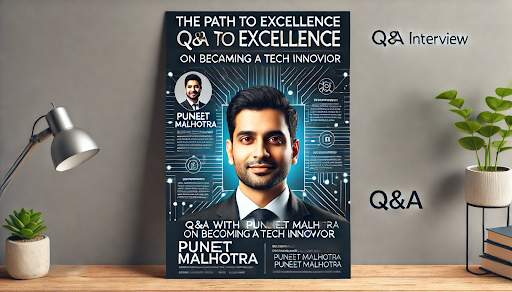The Path to Excellence: Q&A with Puneet Malhotra on Becoming a Tech Innovator

Puneet Malhotra, a tech lead at one of the world’s most prominent companies, has built an impressive career by driving innovation in software engineering. Starting his professional journey in 2006, he honed his skills in enterprise systems and later expanded his expertise in AI-driven automation, process mining, and distributed architectures. With a strong foundation in full-stack development and cloud computing, he has led large-scale transformations, including modernizing legacy systems and integrating AI-powered insights into enterprise platforms. His journey highlights the power of continuous learning, adaptability, and a passion for solving complex engineering challenges. In this Q&A, Puneet shares insights on leadership, emerging technologies, and the future of software engineering.

Q: How did your journey lead you to becoming a leader in software engineering?
Puneet Malhotra: My journey has been a blend of passion for technology, continuous learning, and taking on complex challenges. From my early days studying engineering to earning my Master’s degree at the University of New South Wales in Australia, I was always fascinated by how technology can drive innovation at scale.
I started my career as a software engineer, working on large enterprise systems, and gradually transitioned into roles that allowed me to design and lead high-impact projects. Over the years, I worked on migrating legacy systems, building AI-powered process mining platforms, and developing large-scale distributed applications.
Today, I work for one of the most prominent tech companies in the world, leading engineering initiatives that power mission-critical applications. My role involves full-stack architecture, platform engineering, AI-driven automation, and designing scalable, high-performance solutions. The journey has been challenging yet rewarding, and I firmly believe that embracing new technologies and taking ownership of complex problems are key to growing as a leader in this ever-evolving field.
Q: Can you discuss your early career experience and how you became interested in large-scale software engineering?
Puneet Malhotra: I started my career as a software engineer at Accenture, where I worked on life sciences applications. That experience gave me a strong foundation in structured software development and enterprise systems. Over the years, I moved into roles that allowed me to build and scale platforms, from designing credit card portals to leading chatbot-driven customer service applications serving millions of users.
One of my key turning points was transitioning into a role where I was responsible for migrating legacy systems to modern, cloud native, scalable architectures. This shift made me realize the importance of engineering for resilience, efficiency, and automation. I became particularly interested in leveraging AI and machine learning to improve decision-making processes, which led me to work on business process systems and distributed analytics.
Q: How has software engineering evolved in recent years, and what trends do you see shaping the future?
Puneet Malhotra: The software engineering landscape has changed dramatically. A decade ago, monolithic applications were the norm, and scaling required complex infrastructure solutions. Today, microservices and cloud-native architectures have revolutionized how we build and maintain systems. AI and machine learning have also become integral to modern engineering, not just for automation but for predictive analytics and intelligent decision-making. Looking ahead, I see three major trends:
AI-Augmented Development: AI will play a more significant role in software development, from automated code generation to intelligent debugging.
Event-Driven Architectures: As applications become more interconnected, event-driven and asynchronous processing will be crucial for performance and scalability.
No-Code and Low-Code Platforms: Businesses will increasingly adopt platforms that allow them to automate workflows without extensive engineering effort.
Q: You have worked on AI-driven anomaly detection and automation. Can you share insights on these innovations?
Puneet Malhotra: One of my most exciting projects has been developing a Platform that allows businesses to visualize and optimize their workflows. We built a framework that ingests event data and identifies inefficiencies and anomalies using machine learning. Another innovation I worked on was integrating LLM-based predictive approvals in change management systems. This dramatically reduces manual effort and speeds up decision-making. These AI-driven systems are transforming how businesses approach efficiency, helping them proactively address bottlenecks and improve operational flow.
Q: How do you approach technical leadership, and what advice do you have for aspiring engineers?
Puneet Malhotra: Leadership in technology extends beyond building systems, coding and complex problem-solving, it’s about enabling teams to build scalable, resilient systems. I believe in empowering engineers by giving them the autonomy to make decisions and innovate, leading to more effective solutions which last longer. Continuous learning is equally important, as technology evolves rapidly. Encouraging teams to stay updated with advancements in AI, cloud computing, and distributed systems ensures they remain at the forefront of innovation.
For aspiring engineers, my biggest advice is to stay curious and proactive. Learn beyond your immediate role. Understanding system design, performance optimization, and AI-driven automation will set you apart. Also, never hesitate to take on challenging projects; the best learning comes from solving real-world problems. Focus on impact, not just execution. Writing code is only part of the job, understanding how your work drives business value is what truly sets you apart. Great engineers don’t just write code, they solve problems, identify inefficiencies, and suggest improvements that make a real difference. Staying ahead in AI, cloud computing, and distributed systems will give you an edge in this rapidly evolving industry. Surround yourself with peers and mentors who challenge and inspire you, as building a strong network is essential for growth. Most importantly, embrace change, take ownership, and continuously strive for innovation—those who adapt and push boundaries will always find success.


